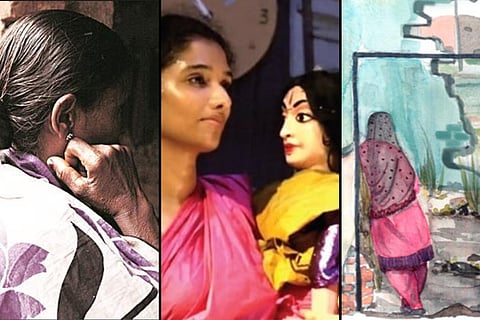

The Social Justice Film Festival is a reminder that we are living in an unequal world, says RP Amudhan, curator of the 12th edition of the festival organised on May 11 and 12 at the St Joseph’s College auditorium. Nine films were screened over a period of two days at the festival held as part of the Blue Pencil, an intercollegiate event conducted by SJC NOUS, a co-curricular society that brings together students to encourage exploration of journalism and cinema. “When we talk about social justice, we are acknowledging that we don’t live in an equal world. People are treated unequally based on their class, caste, race, and gender,” says Amudhan.
Among the films screened at the festival was director Hansa Thapliyal’s The Outside In. The film is about two artists: Francoise Bosteels, who makes dolls to tell stories, and Milan Khandakar, who does it so that other people's stories may begin. There is beauty in Francoise’s wrinkled hands as she needles threads in and out in her gentle holds, as she makes a doll in the likeness of the little girl who was knocked unconscious and bled profusely.
“The film is in some ways unusual, but in other ways very usual,” says Hansa. “It focuses on an interest in dolls. Objects that are seen as too small, too frivolous, and too inconsequential to look at. These are two artists who take what they love utterly seriously.”
Lipika Singh Darai’s Some Stories around Witches tells the tale of multiple women who have been accused of witchcraft and abused for the same. Pano’s voice cracks when she recounts how she was asked to revive the dead, tied to a pole and beaten up when she refused to do so. “We are meant to love, dance, sing, live, and not to suffer” might be the most powerful words ever spoken.
Shramjeevi, directed by Tarun Bhartiya, is the story of migrant workers at the Kapashera border that connects Delhi to Haryana’s Gurugram. It shows people carrying buckets of water in the early morning, beautiful Gurugram nights (shot with reduced exposure), as well as the stagnant positions of workers who create garments that they themselves cannot afford.
Sanjay Barnela’s 2017 film The Colour of My Home is centred around the targeted communal violence that displaced over 60,000 people in Muzaffarnagar. The film starts where the media leaves, says Sanjay. It also asks many questions. What does it mean to build a home? How easy is it to move on for these people, who have been suddenly plucked from their homes and moved to a new place? Is the matter settled? The film also gives its answer through a family visiting their old house, now covered by ever-growing weeds. The answer is given through the mother poignantly touching a brick that juts out from the wall, before she takes the final two steps that puts her on the landing.
What Pankaj Rishi Kumar manages to do in Janani’s Juliet is the act of bringing out a Tamil version of Romeo and Juliet, here Jack and Janani. He does this with splashes of colour, quick wit and humour, besides including little snippets of him talking to the actors, and of the actors themselves having brainstorm sessions on what their character would do. He does this with the intention of narrating a true story as well, that of Shankar, who was attacked in March 2016 for falling in love with and marrying an upper caste woman.
“Social justice conversation is something we need to constantly invest in,” emphasises Dr Arul Mani, Dean of Languages and Head of the Department of English, St Joseph’s College. “There are new forms of injustices taking shape around us, the most recent one being that of a pandemic. Online classes highlighted the difference between those who have laptops and those who do not. It showed us how life was easier for some people and harder for others.”
The other films screened at the festival were Vinod Raja's Bird Trapper or Beggar, Ujjwal Utkarsh's Kaggantu, Farha Khatun's Holy Rights, and Amudhan's Being the Other.